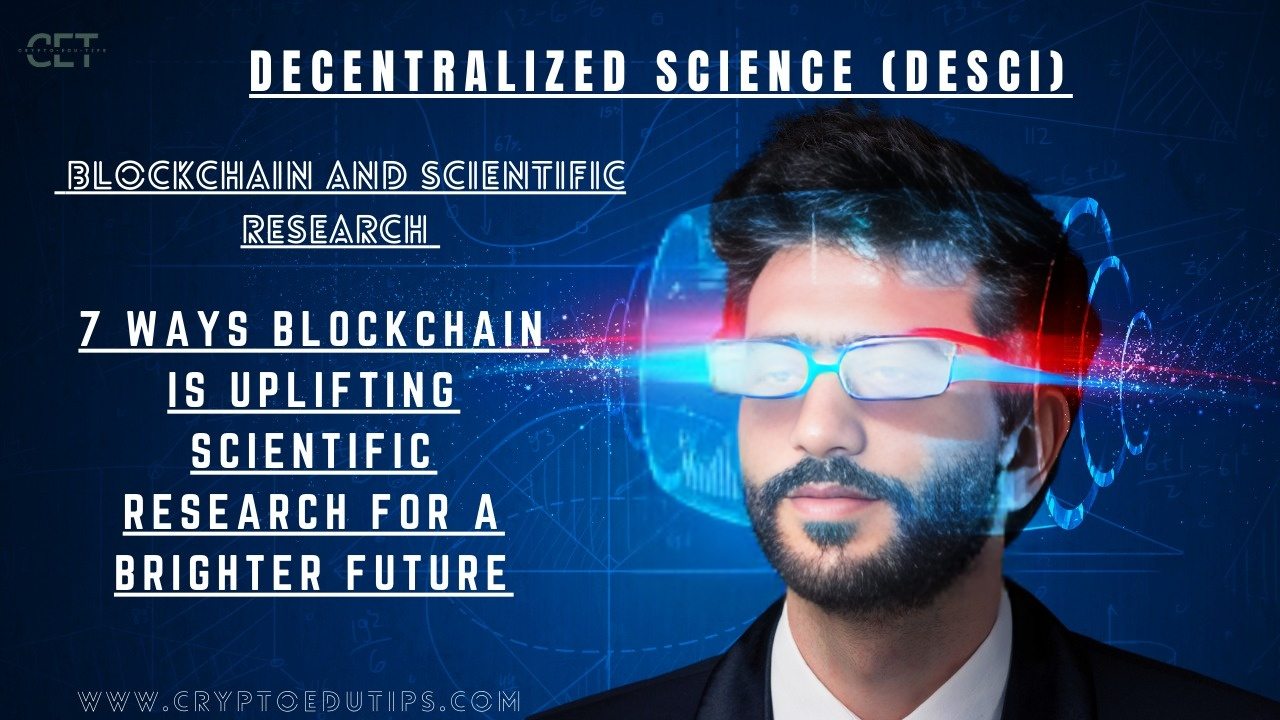Decentralized Science (DeSci)
In recent years, the concept of Decentralized Science (DeSci) has emerged as a groundbreaking approach to scientific research, harnessing the power of blockchain technology. This innovative framework seeks to dismantle traditional barriers within the scientific community, promoting transparency, collaboration, and efficiency. By leveraging blockchain, Decentralized Science (DeSci) is reshaping how research is funded, data is shared, and peer reviews are conducted, ultimately accelerating scientific progress and democratizing access to knowledge.
The integration of blockchain in Decentralized Science (DeSci) offers numerous advantages, including enhanced accountability, improved data integrity, and the creation of decentralized autonomous organizations (DAOs) that facilitate collaboration among researchers. As this movement gains momentum, it is essential to explore the various ways blockchain is transforming scientific research and its implications for the future of the scientific community.
The Challenges of Traditional Scientific Research
Traditional scientific research is often hampered by a range of challenges, including:
- Funding Inequities: Access to funding is frequently limited to established institutions and researchers, leaving many innovative ideas underfunded.
- Data Silos: Research data is often confined within institutional repositories, hindering collaboration and data sharing among scientists.
- Opaque Peer Review Processes: The peer review process can be opaque, leading to biases and a lack of accountability.
- Intellectual Property Concerns: Researchers often face challenges in protecting their intellectual property, which can deter innovation.
These challenges can stifle scientific advancement and limit the potential impact of research. Decentralized Science (DeSci) aims to address these issues by creating a more equitable and transparent research ecosystem.
How Blockchain Facilitates Decentralized Science (DeSci)
Blockchain technology is inherently suited for Decentralized Science (DeSci) due to its decentralized, transparent, and immutable nature. Here are several ways blockchain is being utilized to revolutionize scientific research:
1. Transparent Funding Mechanisms
One of the primary advantages of blockchain in Decentralized Science (DeSci) is the ability to establish transparent funding mechanisms. Through smart contracts, researchers can secure funding directly from donors or investors without the need for intermediaries. This eliminates many of the biases and inefficiencies associated with traditional funding processes.
For example, platforms like LabDAO utilize blockchain to enable researchers to propose projects and receive funding directly from the community. This model not only democratizes access to funding but also ensures that contributors can track how their funds are being utilized, fostering accountability and trust.
2. Enhanced Data Sharing and Integrity
In Decentralized Science (DeSci), data sharing is critical for collaboration and innovation. Blockchain provides a secure and immutable platform for storing and sharing research data. Each transaction on the blockchain is time-stamped and recorded, ensuring that data integrity is maintained.
Platforms like Open Science Framework leverage blockchain to create decentralized repositories for research data. This allows researchers to share their findings openly while retaining ownership and control over their data. Moreover, the transparency offered by blockchain can help combat issues related to data manipulation and fraud.
3. Streamlined Peer Review Processes
The peer review process is often cited as a bottleneck in scientific publishing. Decentralized Science (DeSci) aims to streamline this process by utilizing blockchain-based platforms for peer review. These platforms can provide transparent and efficient review systems where reviewers are incentivized to participate through token rewards.
For instance, Peer Review Blockchain is a platform that facilitates decentralized peer review by allowing researchers to submit their work for review and receive feedback from their peers. The entire process is recorded on the blockchain, ensuring that all contributions are acknowledged and that reviewers are held accountable for their assessments.
4. Protection of Intellectual Property
Intellectual property (IP) is a significant concern for researchers, as it can hinder innovation and collaboration. Decentralized Science (DeSci) utilizes blockchain to establish clear ownership of research outputs, protecting the rights of creators.
By recording research findings, patents, and publications on the blockchain, researchers can create a permanent and verifiable record of their work. This not only protects their IP but also facilitates collaboration by ensuring that credit is given where it is due. Initiatives like IPFS (InterPlanetary File System) are exploring ways to store and share scientific data in a decentralized manner while preserving IP rights.
5. Building Decentralized Autonomous Organizations (DAOs)
Decentralized Autonomous Organizations (DAOs) are an essential aspect of Decentralized Science (DeSci). These organizations operate on blockchain technology and allow members to participate in decision-making processes through token-based voting systems.
DAOs can be used to fund research projects, allocate resources, and manage collaborations within the scientific community. For example, Molecule is a platform that enables researchers to create DAOs for specific projects, allowing them to gather funding, share data, and collaborate without the constraints of traditional institutions.
6. Real-World Applications of Decentralized Science (DeSci)
The principles of Decentralized Science (DeSci) are being applied in various real-world scenarios, demonstrating the potential of blockchain to revolutionize scientific research:
a. Health Research
In the field of health research, Decentralized Science (DeSci) is facilitating collaborations between researchers, patients, and organizations. By utilizing blockchain, researchers can securely share patient data while ensuring privacy and compliance with regulations.
Projects like Holochain are enabling researchers to develop decentralized health applications that empower patients to control their health data and share it with researchers. This not only accelerates research but also promotes patient engagement in the scientific process.
b. Climate Change Studies
Addressing climate change requires collaboration across disciplines and borders. Decentralized Science (DeSci) enables researchers to share climate data and findings in real time, fostering collaboration and driving innovation.
Platforms like ClimateChain leverage blockchain to create decentralized networks for climate data sharing, allowing researchers and organizations to contribute to and access a wealth of information. This collaborative approach can enhance the effectiveness of climate change mitigation efforts.
c. Open Access Publishing
Traditional publishing models often restrict access to research findings, hindering the dissemination of knowledge. Decentralized Science (DeSci) promotes open access publishing, allowing researchers to publish their work on blockchain-based platforms without paywalls.
Initiatives like Sci-Hub and ArXiv are paving the way for open access publishing, providing researchers with the opportunity to share their findings widely. By removing barriers to access, Decentralized Science (DeSci) ensures that knowledge is available to all, fostering a more inclusive scientific community.
7. The Future of Decentralized Science (DeSci)
As Decentralized Science (DeSci) continues to gain traction, its future looks promising. The integration of blockchain technology in scientific research is expected to evolve, leading to:
- Increased Collaboration: Researchers from different disciplines and locations will collaborate more effectively, breaking down silos and fostering innovation.
- Improved Funding Opportunities: With transparent funding mechanisms, researchers will have access to a broader range of funding sources, allowing for more diverse and innovative projects.
- Greater Trust and Accountability: The transparency of blockchain will enhance trust in scientific research, as stakeholders can verify the integrity of data and funding.
- Empowered Researchers: Researchers will have greater control over their work and the ability to protect their intellectual property, fostering a culture of innovation.
Decentralized Science (DeSci) represents a transformative shift in the scientific research landscape, driven by the innovative applications of blockchain technology. By promoting transparency, collaboration, and efficiency, Decentralized Science (DeSci) is addressing long-standing challenges within the scientific community.
The real-world applications of Decentralized Science (DeSci) in health research, climate change studies, and open access publishing highlight its potential to revolutionize how we conduct and share scientific research. As this movement continues to evolve, it is crucial for researchers, institutions, and policymakers to embrace Decentralized Science (DeSci) and explore the opportunities it presents.Through the integration of blockchain, Decentralized Science (DeSci) is not only changing the way we approach scientific research but also paving the way for a more equitable and inclusive scientific community. As we look to the future, the continued advancement of Decentralized Science (DeSci) will undoubtedly play a pivotal role in shaping the future of research, fostering innovation, and driving progress across various fields of study.
Principles of Decentralized Rese
Starting a Decentralized Science (DeSci) initiative involves understanding the principles of decentralized research and effectively utilizing blockchain technology to enhance collaboration, transparency, and efficiency. Below is a comprehensive guide on how to kickstart a DeSci project, covering essential steps and considerations.
1. Understand the Principles of DeSci
Before diving into the technical aspects, familiarize yourself with the core principles of Decentralized Science (DeSci):
- Transparency: Emphasize open access to data, methodologies, and funding sources.
- Collaboration: Encourage cross-disciplinary partnerships and community engagement.
- Decentralization: Utilize blockchain technology to reduce reliance on traditional institutions and intermediaries.
- Incentivization: Develop mechanisms to reward contributions, whether through funding, data sharing, or peer review.
2. Define Your Goals and Objectives
Determine the specific goals of your DeSci project. Consider the following questions:
- What scientific problem are you trying to solve?
- Who are the target beneficiaries (e.g., researchers, patients, organizations)?
- What outcomes do you hope to achieve (e.g., improved data sharing, new funding models)?
Example Goals
- Create a decentralized platform for sharing climate research data.
- Establish a funding mechanism that allows direct community contributions to scientific projects.
- Develop a transparent peer review system to enhance research integrity.
3. Identify Stakeholders and Build a Team
Engage with stakeholders who share your vision for DeSci. This may include:
- Researchers: Collaborate with scientists who are interested in decentralized approaches to research.
- Developers: Recruit blockchain developers to help build your platform.
- Data Scientists: Involve data analysts to ensure proper data management and analysis.
- Community Members: Engage with the broader community, including potential contributors and users.
Building a diverse and committed team is crucial for the success of your initiative.
4. Choose the Right Blockchain Technology
Selecting the appropriate blockchain platform is a critical step. Consider the following factors:
- Scalability: Choose a blockchain that can handle a high volume of transactions.
- Cost: Evaluate transaction fees and operational costs.
- Interoperability: Opt for platforms that can interact with other blockchains for enhanced collaboration.
- Community Support: Assess the development community’s size and resources available for the chosen blockchain.
Recommended Blockchains for DeSci
- Ethereum: For smart contracts and a wide range of dApps.
- Polygon: A Layer 2 solution for lower fees and faster transactions.
- Solana: Known for high throughput and low costs.
- Ocean Protocol: Specifically designed for data sharing and monetization.
5. Develop a Prototype or Minimum Viable Product (MVP)
Once you have a clear vision and a team in place, start developing a prototype or MVP of your DeSci platform. Focus on key features that will address your goals. Key components may include:
- Data Storage and Sharing: Create mechanisms for securely storing and sharing research data.
- Funding Mechanisms: Implement smart contracts for transparent funding and donations.
- Peer Review System: Develop a decentralized peer review process to enhance accountability.
Example Tools for Development
- Smart Contract Development: Use tools like Truffle or Hardhat for Ethereum smart contract development.
- Web Development: Use frameworks like React or Vue.js for building user interfaces.
- Data Storage: Consider decentralized storage solutions like IPFS or Filecoin for data retention.
6. Implement Governance Mechanisms
Establish governance structures that promote community participation and decision-making. Consider forming a Decentralized Autonomous Organization (DAO), which allows stakeholders to vote on key decisions, including funding allocations, project direction, and platform enhancements.
Key Governance Principles
- Transparency: Ensure all governance processes are open and accessible to participants.
- Inclusivity: Encourage diverse participation from all stakeholders.
- Accountability: Implement mechanisms for holding participants accountable for their contributions and decisions.
7. Engage the Community
Successful DeSci initiatives thrive on community engagement. Here are some strategies to foster collaboration:
- Workshops and Seminars: Host educational events to inform stakeholders about DeSci principles and your project.
- Social Media and Online Forums: Use platforms like Twitter, Discord, or Reddit to create discussions around your initiative.
- Collaborative Projects: Encourage collaborative research projects that involve community participation.
8. Test and Iterate
Once your platform is operational, conduct testing to identify potential issues and gather feedback. Use this information to iterate on your platform and improve functionality, user experience, and overall effectiveness.
Testing Approaches
- User Testing: Invite users to test the platform and provide feedback on usability.
- Bug Bounties: Implement a bug bounty program to incentivize external developers to identify and fix vulnerabilities.
9. Launch and Promote Your Initiative
After refining your platform based on feedback, launch your DeSci initiative publicly. Promote your platform through various channels to attract users and collaborators:
- Press Releases: Announce your launch to relevant media outlets and blogs.
- Partnerships: Collaborate with academic institutions, organizations, and influencers in the scientific community.
- Content Marketing: Share articles, videos, and case studies to demonstrate the impact of your project.
10. Monitor, Evaluate, and Scale
After the launch, continuously monitor the platform’s performance and gather data on user engagement and project outcomes. Evaluate whether you are meeting your goals and identify areas for improvement.
Scaling Your Initiative
- Expand Features: Introduce new functionalities based on user feedback and emerging needs.
- Broaden Reach: Explore partnerships with international organizations or research groups to scale your impact.
Starting a Decentralized Science (DeSci) initiative requires a clear vision, collaborative efforts, and effective use of blockchain technology. By following the steps outlined above, you can create a platform that enhances transparency, fosters collaboration, and drives innovation in scientific research. As the DeSci movement continues to evolve, embracing these principles will help you contribute to a more inclusive and efficient scientific community.
the right blockchain for Decentralized Science (DeSci) initiatives is crucial for ensuring transparency, security, and efficiency in scientific research. Here are several blockchain platforms that are particularly well-suited for DeSci applications:
1. Ethereum
- Overview: Ethereum is the most widely used platform for decentralized applications (dApps) and smart contracts, making it a popular choice for DeSci projects.
- Use Cases: Many DeSci projects, like Giveth (for funding scientific research) and RoboVault (for secure data storage), utilize Ethereum’s robust ecosystem.
- Benefits:
- Strong developer community and extensive documentation.
- Supports complex smart contracts, which can automate funding and peer review processes.
2. Polygon
- Overview: Polygon is a Layer 2 scaling solution for Ethereum, offering faster transaction speeds and lower costs.
- Use Cases: Projects like Aavegotchi and ZyCrypto leverage Polygon for decentralized applications that require rapid transactions.
- Benefits:
- Reduced gas fees compared to Ethereum.
- Compatibility with Ethereum’s ecosystem, enabling easy migration of dApps.
3. Solana
- Overview: Solana is a high-performance blockchain known for its scalability and fast transaction speeds.
- Use Cases: DeSci projects focused on real-time data sharing, like Phantom and Star Atlas, can benefit from Solana’s high throughput.
- Benefits:
- Extremely fast transaction times (thousands per second).
- Low transaction costs, making it affordable for researchers and organizations to interact on-chain.
4. Polkadot
- Overview: Polkadot is designed for interoperability between blockchains, allowing multiple chains to communicate and share data.
- Use Cases: Projects that require collaboration across different blockchain networks, such as Moonbeam and Acala, can leverage Polkadot’s unique architecture.
- Benefits:
- Facilitates cross-chain data sharing, which is essential for collaborative research.
- Parachains can be customized for specific DeSci needs.
5. Cardano
- Overview: Cardano is a proof-of-stake blockchain known for its emphasis on security and sustainability.
- Use Cases: DeSci initiatives focused on secure data management, like Atala PRISM, use Cardano for identity verification and credentialing.
- Benefits:
- Strong focus on academic research and peer-reviewed development.
- Energy-efficient consensus mechanism.
6. Tezos
- Overview: Tezos is a self-amending blockchain that supports smart contracts and dApps.
- Use Cases: Projects like Harbor are utilizing Tezos for creating decentralized marketplaces for research data.
- Benefits:
- On-chain governance, allowing the protocol to evolve with community input.
- Formal verification of smart contracts, enhancing security.
7. Hyperledger Fabric
- Overview: Hyperledger Fabric is a permissioned blockchain framework tailored for enterprise solutions, suitable for scientific organizations.
- Use Cases: Organizations requiring privacy and confidentiality, such as pharmaceutical companies, may use Hyperledger Fabric for clinical trials.
- Benefits:
- Fine-grained access control and permissioned networks.
- High throughput and customizable consensus algorithms.
8. Ocean Protocol
- Overview: Ocean Protocol is a blockchain-based platform designed specifically for data sharing and monetization.
- Use Cases: DeSci projects focused on sharing research data while maintaining control and privacy can benefit from Ocean Protocol.
- Benefits:
- Data marketplaces where researchers can buy and sell datasets.
- Emphasis on data privacy and control.
9. Arweave
- Overview: Arweave is a decentralized storage network that focuses on permanent data storage.
- Use Cases: DeSci projects requiring long-term data retention, such as archiving research findings, can utilize Arweave.
- Benefits:
- Permanent data storage ensures research findings are always accessible.
- Low-cost storage solutions for researchers.
10. Filecoin
- Overview: Filecoin is a decentralized storage network that allows users to rent out their unused hard drive space.
- Use Cases: Scientific projects requiring large data storage can leverage Filecoin for secure, decentralized storage solutions.
- Benefits:
- Pay-per-use model for data storage.
- Strong focus on data integrity and availability.
Key Considerations for Choosing a Blockchain for DeSci
When selecting a blockchain for Decentralized Science (DeSci), consider the following factors:
- Scalability: The platform should handle a large volume of transactions, especially for projects with extensive data sharing and collaboration.
- Interoperability: Look for blockchains that can interact with other networks, facilitating cross-collaboration in research.
- Community and Ecosystem: A robust developer community and existing projects can provide support and resources for new initiatives.
- Security: The platform should offer strong security measures to protect sensitive research data and intellectual property.
- Cost: Evaluate transaction fees and storage costs to ensure that the platform is economically viable for researchers.
The choice of blockchain for Decentralized Science (DeSci) is crucial to the success of scientific initiatives aiming for transparency, collaboration, and efficiency. Each blockchain platform offers unique features and benefits, making them suitable for different types of research projects. By leveraging the capabilities of these blockchains, the scientific community can overcome traditional challenges and foster a more inclusive and innovative research environment. As the DeSci movement continues to grow, it is essential for researchers to stay informed about these technologies and consider how they can best utilize them in their work.
Conclusion:
Decentralized Science (DeSci) represents a transformative evolution in the scientific research landscape, driven by the innovative application of blockchain technology. By addressing the significant challenges inherent in traditional research practices—such as funding inequities, data silos, and opaque peer review processes—DeSci fosters a more equitable and transparent ecosystem. This movement empowers researchers to collaborate across disciplines and borders, share data securely, and protect their intellectual property, ultimately accelerating scientific advancement.
As we have seen, blockchain technology offers numerous benefits that are crucial for the success of DeSci initiatives. From transparent funding mechanisms and enhanced data integrity to streamlined peer review processes and the establishment of decentralized autonomous organizations (DAOs), the potential for innovation is immense. Real-world applications in health research, climate studies, and open access publishing illustrate how DeSci can reshape the way scientific knowledge is generated and disseminated.
Moving forward, it is essential for researchers, institutions, and policymakers to embrace the principles of Decentralized Science (DeSci). By doing so, they will not only contribute to a more inclusive and efficient scientific community but also ensure that knowledge is accessible to all. As the DeSci movement gains momentum, its continued evolution will play a pivotal role in shaping the future of research, fostering innovation, and driving progress across various fields of study. In this way, Decentralized Science (DeSci) stands as a beacon of hope for a more collaborative, transparent, and effective scientific future









